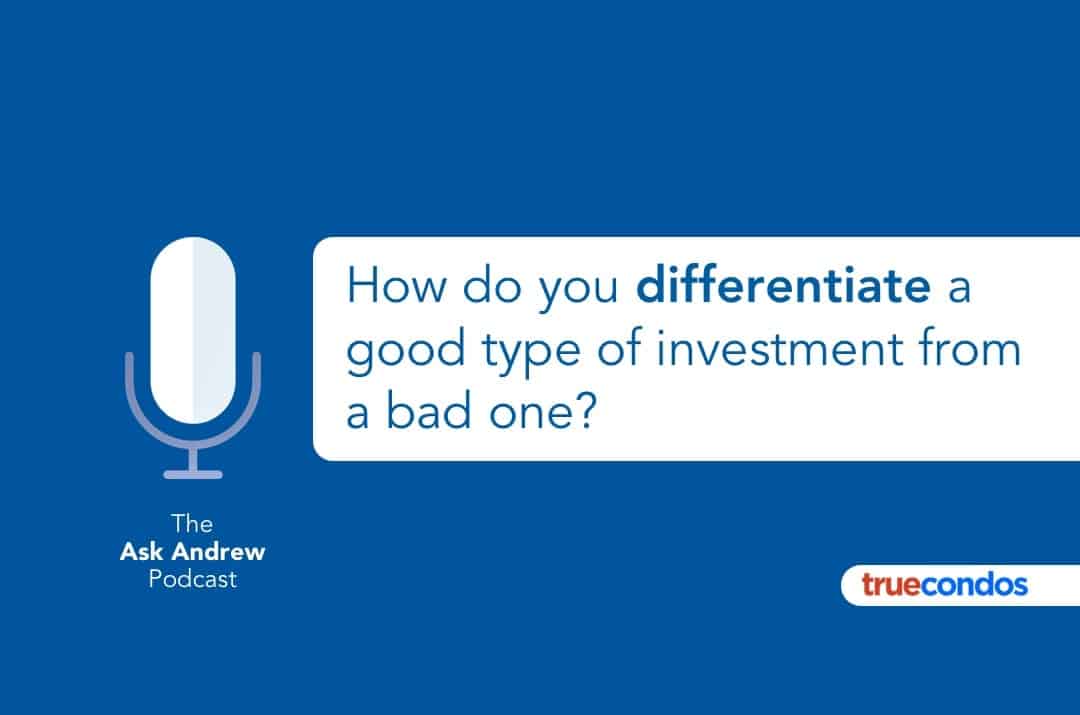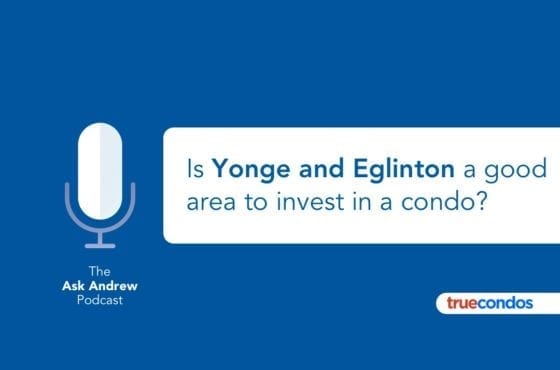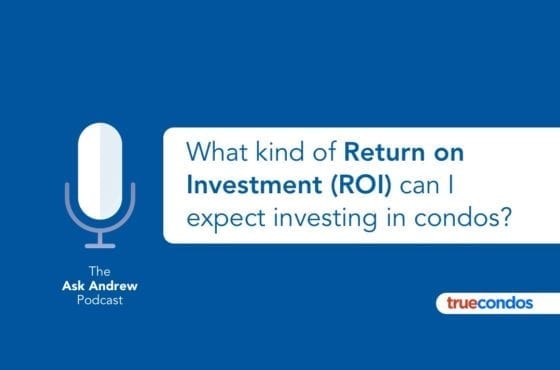How do you differentiate a good type of investment from a bad one?

How do you differentiate a good type of investment from a bad one? We discuss the differences between investing in condos downtown and small town Ontario condos with Juan.
[popup_trigger id=”36861″ tag=”button”]Ask a Question[/popup_trigger]
TRANSCRIPT
Andrew la Fleur: Welcome to the Ask Andrew Podcast, real questions from real condo investors. You ask, I answer.
Hi and welcome back to the Ask Andrew Podcast. On today’s episode we are speaking to Juan. Juan is a first time investor and some of the questions that Juan had for me were how to you differentiate a good type of investment from a bad one. Talked about investing in condos in downtown Toronto versus the alternative of investing in smaller towns in Ontario. What are the pros and cons of different investment types?
And we talked about a few other things, so I hope you enjoy this conversation today with Juan. And once again, if you are interested in having your questions answered, I’d love to do so. Just go to askandrewpodcast.com, click on ask a question. I’d love to be able to chat with you and have you on a future episode.
So without further ado, here is my conversation with Juan.
What’s the biggest question on your mind or what would you like to talk about?
Juan: Well I just think my biggest question is how to tell a bad investment from a good investment in terms of condos because there’s so many in Toronto that it’s hard to tell which ones are worth it, and which ones will not really be worth it?
Andrew la Fleur: Yeah, that’s a great question. Can you just tell me a little bit more about where you’re coming from in terms of, are you a condo investor already? Are you looking to get into it for the first time? Own any property-
Juan: The most I’ve done is gone to a real estate investment seminar and his conclusion was basically to stay out of the city and go for low cost investments. That’s why I was curious about expensive things like condos in the city. Like how-
Andrew la Fleur: Well maybe let me start by asking you, what did you think about that idea that you brought forward at the seminar. Do you agree with it, you don’t agree with it? Did you like what you see, you don’t like what you see? What are your thoughts on what you know so far about what you’re interested in, in a permanent investment standpoint?
Juan: There’s a lot of management involved in low cost properties. From what I got from him, they’re time implements, but I’m guessing are high expense buildings. I don’t see any difference from what I understand. I see that at least with the beginning they would be a smart decision to go for a low cost once there’s some capital and something in the portfolio, than to go for more expensive properties.
That’s what I-
Andrew la Fleur: In terms of, when you talk about low cost, just so understand where you’re coming from, what do you exactly by low cost properties versus high cost properties?
Juan: Like a $200,000 nine-unit building in the middle of nowhere.
Andrew la Fleur: Okay. Where in nowhere is that?
Juan: Like outside Stratford, Ontario.
Andrew la Fleur: Outside Stratford, small town Ontario kind of thing. Couple hours away from the city, kind of thing.
Juan: Exactly, yeah.
Andrew la Fleur: Right, right.
Yeah, that’s certainly one investment strategy to take and one that some people like that I would say is sort of low risk, low return scenario. Buying into smaller markets like that, buying, like you said, cheaper properties where prices are lower rent, or lower … but also historically appreciation rate of prices and rents are lower as well, compared to investing in a big city like Toronto.
So yeah, if you’re looking for something stable, consistent, predictable, that’s going to give you good cash flow, then if you’re looking for a low entry point to get started then those types of investments can make sense for you.
If you’re looking for something that’s going to appreciate more, that’s going to have value and that’s going to have rents that are going to appreciate more in value in the long run and potentially cost more. Something like downtown Toronto condos at the other end of the spectrum.
My point is that there’s pros and cons to every different type of investment strategy. It comes down to you and your preferences as person, as an investor. What kind of life … How much time you want to put into this. For me and for most of my clients, why they like condos, downtown condos specifically, and previously-construction condos, is their low maintenance, very little work required. It’s sort of hands free type of investment like you eluded to the fact that these types of properties in small town Ontario, like little apartment buildings and things like that, much higher maintenance, higher maintenance buildings but also higher maintenance tenants, issues related to being a property manager.
Most people who come to me and are looking to invest, they’re not interested in really being property managers. They’re just interested in taking part in the real estate market. They want to see a good return, but they don’t want to do a lot of work for it.
Juan: Okay, that’s actually what I would be looking for. I prefer that.
Andrew la Fleur: Fundamentally that’s one of the beauties of buying a previously-construction condo, because you’re buying something that’s brand new. A brand new condo itself, is very little maintenance to do. You could easily own six, seven, eight condos and self manage all of them and put in very little work. I like to say, in my years of doing it, it averages out if you add up all the time that you put into managing these things, it’s prop about one hour per month per condo that you own.
Juan: Wow.
Andrew la Fleur: If you had 10 condos over time, you’re probably only putting in about 10 hours a months for 10 condos. Sure some months you might have some issue or something, and have to put in a day’s work, six hours, seven hours to fix some issue or deal with some situation. But then you might not have to touch it again for 18 months at all.
But when you average it all out, that’s roughly how I’ve seen the math work out for myself and my clients over the years. Part of the reason is that, it’s again brand new property that you’re buying, so there’s not really anything that’s breaking. The other things is that you’re buying apartments. It’s not like buying a house where you have an entire structure to consider and to worry about.
Last night there was here in the GTA, there was a big wind storm that came through, knocked a lot of trees down, stuff all over the place. As a condominium owner, you’re like. “Who cares? It’s not going to affect me at all.” You don’t even think about. And the homeowner, as a property owner, as a land owner, if you own duplex or apartment buildings, things like that, you are worried. You’re concerned. You’re potentially losing sleep or you might have to deal with an issue, weather and stuff like that. That’s just one example I just bring up, because I own both types of investment properties myself.
So last night I found myself thinking, “Shoot. I hope no trees or branches are falling down on my rental house over there.” Then I though about my condos, and am like, “Well, my condos are all fine.”
Now I got to check in today with the tenants of the house, make sure everything is okay and those no branches through my roof or anything like that.
That’s different types of investments for different types of people, but it sounds like you’re attracted to condos for the same reason and you’re looking for something lower maintenance and [crosstalk 00:09:01].
Juan: Passive income.
Andrew la Fleur: Yeah. Passive income. You want real estate to fund your life but not to be your life, is another way we talk about it. Like if you have a job, and career, and family I mean you don’t want to be doing real estate stuff all the time, but you do want to participate in it. So that’s the beauty of condos.
That’s a good context for moving forward in our conversation, I guess. Going back, you want to go back to your original question or do you want to look at something else? Ask me something else?
Juan: You talked about clients. I guess, kind of a disclaimer. Are you working for yourself or are you contracted to the Dueast Condo Regency Square, where I got your show from?
Andrew la Fleur: Yeah, great question.
Who do I work for? I am an independent real estate agent. I work under the RE/MAX banner of real estate brokerage, but I don’t work for any developers. I am not employed by any developers. My service is to buyers, to investors. I represent buyers, investors to developers, bringing them to developers.
The developers, it’s a great thing to understand how the business works. When you go into a developer sales office, the people in there that work there, they’re employees of the developer. They work for the developer. Their obligations are 100% to the developer and they have zero obligations to you. SO you always want to have your own buyer’s agent. Somebody like me who’s representing your interest and looking out for you when you are buying any condo, pre-construction, resale or otherwise.
Juan: [crosstalk 00:10:59] going forth. It seemed like there was, I guess not a conflict of interest but like another … I was basically asking if you had commission coming out of you becoming an investor in the property. Or if you-
Andrew la Fleur: Yeah. Absolutely I do have commission. Yeah. Let’s be clear. I do get commission. I get paid when you purchase or sell property.
Juan: But there’s no conflict of interest, correct? Not conflict of interest-
Andrew la Fleur: Correct. No, conflict of interest is the right word. Yeah. I mean, basically what I do and my philosophy is to go and seek out the best investment opportunities and bring them to my clients. I’m very selective about which projects and which developers I will work with, which developers and projects I will promote to my clients and put out there as saying this is a good investment, pretty much stamp of approval on it.
That’s maybe looping back to the original question of how do I choose these projects and which ones do I elect to recommend versus those I don’t. That’s one of the things I talk about all the time as well as, I say 95% of all condos out there are not a good investment.
Juan: Yeah. I saw that ad in your-
Andrew la Fleur: Yeah. You need to find out the 5% that are. That’s what I’m here to do, to help you find the 5% that are going to be that great investment that’s going to out perform the market, That’s going to do better than if you just bought anywhere. Some people buy anywhere and they think, “Well, I bought something. I’m doing well. I’m happy with that.”
But they don’t realize if they had been more selective and picked a different one, they could have done much, much better, and they could have out performed the market. We’re not looking to do average. We’re looking to do very, very well as investors.
That’s what I do, is basically, I analyze the different projects and different opportunities that come across my desk every single week and I look at which ones I think have the most potential, which ones are going to give the best return, best bang for you buck. Which particular units in a particular project are better to buy in than other units. Even within a given project you have some good units to get into and some bad units to get into, that are not as good units to get into.
Juan: Sure. How do you differentiate with a unit? What do you look for?
Andrew la Fleur: Yeah, so when you’re talking about what’s a unit level, it’s building by building. You really have to analyze each building independently. It depends on a number of factors. Location of the building, layouts, what prices the developer has set for do if units. Occasionally, the developer will under price certain units versus others. And there’s opportunities to be had by picking one units over another in a given building.
One of the general principles that we always go back to for this question of what is the best unit to buy. Generally speaking, not a 100% rule, but it’s a great rule to understand and apply, and it’s basically, when you buy the smallest unit of a given type, then you’re generally going to do well. So, if you buy the smallest studio unit out of the studio layouts. If you buy the smallest one bedroom unit out of the one bedroom layouts.
Juan: Oh, interesting.
Andrew la Fleur: The smallest two bedroom. Yeah
SO the smallest unit is going to generally be the cheapest unit and it’s going to generally give you the best cash flow as a rental and it’s going to generally give you the highest appreciation rate over time as well. It goes to efficiency. The more efficient of the layout, because when it comes to rentals, you don’t advertise how many square feet it is, renters don’t rent, “I’ll give you x dollars per square foot for your unit.”
No. They just tell you, “I’ll give you this much for a unit.” They’re looking for a one bedroom, then they see the add and it says this is a one bedroom. They’re not looking for a 550 to 580 square foot one bedroom. No. They’re just looking for something that has sone bedroom that functions as one bedroom.
So a 500 square foot one bedroom is going to rent for pretty much the same price as a 600 square foot one bedroom, but the 600 square foot ne bedroom is going to cost a lot more to buy. So your cash flow [crosstalk 00:16:03] everything. Yeah is going to be better on the smaller units.
That’s a great principle to understand and to look at. It’s not always possible to buy that smallest unit because generally they are very high demand with investors, but if you can, all things being equal, then those are good units to look at getting.
Juan: Okay. I signed up for your newsletter or whatever. And Dueast Condos at Yonge and Eglinton. Do you remember that one?
Andrew la Fleur: E2 Condos?
Juan: Yeah E2. Sorry not Dueast. You’re right.
Andrew la Fleur: Yeah. Dueast is Region Park. Yeah E2 at Yonge and Eglinton. Ah-huh.
Juan: Yeah. Sorry, my mistake. Ac that’s a good. How would you compare the E2 Condos with the Dueast Condos?
Andrew la Fleur: It’s sort of apples to oranges.
Juan: Oh really.
Andrew la Fleur: They’re very different projects. Different neighborhoods. Different types of properties. Yonge and Eglinton can directly connected to the subway, and the LRT, and shopping center. Obviously the price points are completely different. Dueast Regent Park, emerging neighborhood, 50 story building versus 29 story building. I wouldn’t compare them directly. There’s different types of properties are going to be good for different reasons.
Juan: Okay.
Andrew la Fleur: Anytime you’re buying something on Yonge Street like that, it’s like a prestige property, a prestige location.
It’s blue chip, you can’t go wrong. It’s always been good and it always will be good.
Something like Regent Park, again it’s more of a gentrifying, changing neighborhood. You’re buying more on the up side potential of what’s happening there, and the investments that are going to go in to change the area over time.
You’re buying something like, Dueast, you’re buying it more for the potential for cash flow, with a secondary potential for appreciation. With something like E2, you’re buying it more for appreciation with the secondary potential for cash flow. It’s different sort of a play there
With Dueast, the building is going to be done in less than three years. With E2, it’s probably going to be four to five years.
Juan: Think they said 2022. So you’re right.
Andrew la Fleur: Yeah. Great properties, both of them great. I’ve invested in both neighborhoods, and those types of properties there, but for different reasons. So again, it goes to what type of investor you want to be and obviously how much you have to invest is a big point to, because like I said, E2 obviously is going to be a lot more expensive than Dueast.
Juan: Yeah. Okay.
Thank you very much. It was very informative.
Andrew la Fleur: Great. Okay. Thanks Juan. I’ll talk to you soon. Thanks for the call.
Juan: Okay.
Andrew la Fleur: Thanks for listening to the Ask Andrew Podcast. To get your question answered, just go to askandrewpodcast.com, and click “ask a question.”



